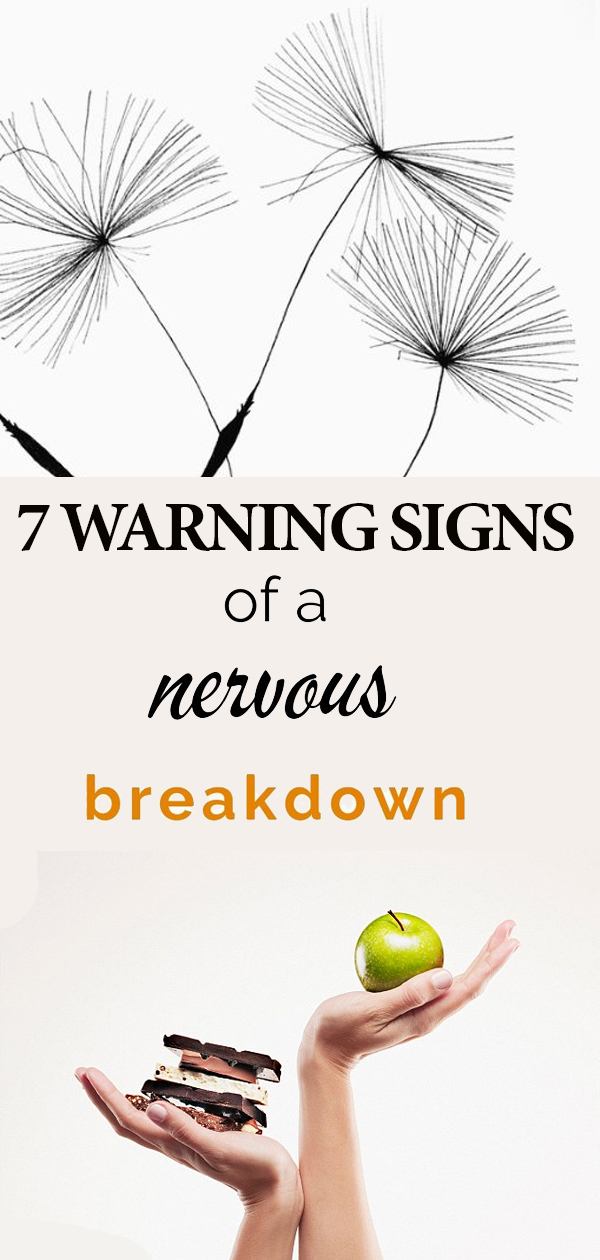What is a ‘nervous breakdown’?
The term “nervous breakdown” was considered a medically legitimate condition. It was once used to describe an array of mental illnesses, including acute stress disorder, anxiety, and depression.
Today, the term “nervous breakdown” describes intensive symptoms of stress and an inability to cope with life challenges. Often, these symptoms stem from an underlying mental health disorder (e.g., PTSD, chronic anxiety.)
“A Nervous or mental breakdown is a term used to describe a period of intense mental distress. During this period, you’re unable to function in your everyday life.” ~ Healthline
If an individual lacks internal and/or external means of coping with stressors, they are more prone to a severe anxiety-related disorder. Severe anxiety disorders (e.g., panic disorders and some phobias) and their symptoms can feel as if one is experiencing a “nervous breakdown.”
7 Early Signs Of A Nervous Breakdown
Prolonged periods of stress will eventually inhibit one’s ability to function normally. High levels of stress, over a protracted period, will almost certainly have psychological effects. Of course, the earlier that one detects symptoms and takes appropriate action, the better. Sans treatment, the risk of developing a lifetime mental illness increases drastically.
Obviously, we don’t want this to happen. It benefits us, then, to understand some early signs of a “nervous breakdown.” Here are seven:
1. Abusing Alcohol Or Drugs
Mental breakdowns and substance abuse often go hand-in-hand. Both are used as a method of coping, and both serve only to exacerbate the problem. Chronic abuse of drugs or alcohol will rewire the brain, damage the body, and intensify all other symptoms.
2. Sleeping Too Much Or Not Enough
Sleep, like alcohol and drugs, is often used as a coping mechanism. While excessive sleep may not be as dangerous as illicit substances, it reinforces avoidance behavior (used as an “escape.”) Insomnia-like symptoms may surface for many reasons: overthinking, substance abuse and hormonal changes are three common ones.
3. Constant Fatigue
The body and brain are simply not designed to withstand neverending stress. Continuous distress saps our cognitive energy, which in turn drains our bodily energy. Fatigue may also show up as noticeable physical weakness. This may make it hard to do the things we need to do.
4. Anxious Or Depressive Symptoms
No surprise here; anxiety and depression are two catalysts of a nervous breakdown. As mentioned, doctors used to refer both as a nervous breakdown; and they are indeed similar. Mental breakdowns, like anxiety and depression, are slow to form. One may first notice a slight inability to concentrate or a bit more difficulty getting out of bed, for example.
5. Brain Fog
Brain fog, also referred to as ‘clouding of consciousness,’ is an unofficial medical term denoting an abnormality of the overall level of consciousness. The brain’s executive functions – attention, planning, self-control, decision-making, and memory – are regularly the first to experience the brunt of brain fog.
6. Panic Attacks
A panic attack is a terrible experience that involves a sudden urge of overwhelming anxiety and fear. The patient/victim may feel like they’re losing their mind, perhaps even dying. Symptoms comprise difficulty breathing, a racing heartbeat, chest pains, and extreme dizziness.
7. A Sense Of Overwhelm
Dr. Heather Monrow, MSW, LCSW, a director of a mental health treatment at Newport Academy in Connecticut, says “Even small everyday tasks begin to feel like too much to cope with, and social situations seem overwhelming.” Monroe attributes this sense of overwhelm to an “ongoing buildup of worry and stress.”
Getting Help
It’s common for someone to feel, at some point in life, an inability to deal with life’s stressors. If you suddenly experience a sense of overwhelm, panic, or any of the abovementioned symptoms, please seek the advice of a medical doctor.
Your doctor will treat the physical symptoms and may refer you to a psychologist or psychiatrist; who will then decide the best course of action in addressing your behavioral, emotional, and mental symptoms. Caregivers should also contact a doctor as soon as possible if they’re worried about a loved one’s behavior or psychological state.
Altering one’s lifestyle may help prevent a nervous breakdown. Good lifestyle habits lessen the severity and frequency of symptoms, as well as increase the likelihood of recovery. Here are a few ideas:
– get regular exercise: at least three times a week, for 30 minutes
– learn about and practice mindfulness meditation (perhaps the best self-help advice!)
– avoid drugs, alcohol, caffeine, and other stress-inducing substances
– set a regular sleeping schedule and stick to it (even on weekends)
– get 6-8 hours of quality sleep per night
– learn instant relaxation techniques (e.g., “the relaxation response.”)
– incorporate deep breathing into your daily routine
– pace yourself, take mini-breaks, organize your environment and daily activities, and keep a daily to-do list
– stretch or take a brisk walk during break times
– delegate or get someone to help with taxing work
Per mentalhealth.gov, trained crisis workers are available to talk 24 hours a day, 7 days a week at 1-800-273-TALK (8255).
A live chat option is available at https://suicidepreventionlifeline.org.


